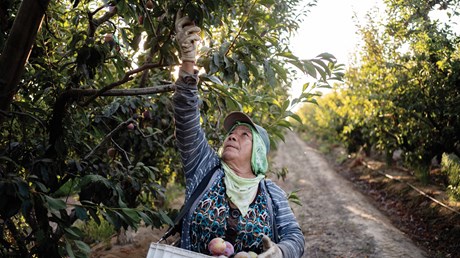How pastors, farmers, and activists on both coasts are caring for migrant farm workers.

In early spring, the coronavirus pandemic sent the global food supply chain into disarray. In US grocery stores, prices surged, and many items—not just toilet paper—simply disappeared from shelves.
At some fruit and vegetable farms across the country—particularly those that sell directly to consumers or stores—business remained strong or even improved. But other farms watched the market for their produce dry up overnight, forcing them to cut operations, pull acreage out of production, and endure the heartbreak of tilling harvest-ready crops into the ground.
At the base of this teetering agricultural system are migrant farm workers. Just under 10 percent of laborers come to the United States on H-2A visas, which allow them to work in agriculture for up to 10 months. The other 90 percent of seasonal farm workers live domestically and often earn minimum wage, patching together jobs in hospitality, restaurants, and a rotating schedule of crops. Nearly half are not authorized to work in the United States.
For many workers, the pandemic has made an already difficult living even more daunting. Growers and packing houses laid off workers. The virus moved quickly through some farms and buildings that house agricultural workers, many of whom don’t have health insurance.
CT met with pastors, farmers, field workers, and activists in California and North Carolina who were ministering to migrant farm workers before the pandemic and continue to do so today. In ministries of word, mercy, and justice, these Christians are approaching the complex challenges facing laborers in ways that are varied and, at times, even contradictory.
Word
San Joaquin Valley, California
The sun had not fully risen when Tom Rios sat down ...
from Christianity Today Magazine
via


.gif)

.gif)
.gif)
